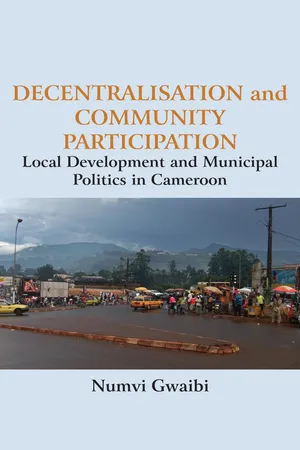
Decentralisation and Community Participation
Local Development and Municipal Politics in Cameroon
- 288 pages
- English
- PDF
- Available on iOS & Android
Decentralisation and Community Participation
Local Development and Municipal Politics in Cameroon
About This Book
This book explores how policies of decentralisation and community participation adopted in Cameroon in 1996 have played out on the ground since 2004. These reforms were carried out amid economic crisis, structural adjustment and political upheaval. At the time, popular sentiment was that change on the economic and political fronts was imperative. However, the ruling elite, some of whom had been shuttling around the state apparatus since independence, feared that succumbing to popular demands for change was tantamount to political suicide, as was the case elsewhere on the continent. These elites thwarted opposition demands for a sovereign national conference to discuss constitutional reform. The Francophone-dominated elite fiercely objected to Anglophone demands for the restoration of the Federal state that was dissolved in 1972. Instead, decentralisation was presented as an authentic forum for grassroots autonomy and municipal councils as credible arenas for community participation in local development. This study adopts an interdisciplinary approach to unearth the permutations of decentralisation and community participation in Cameroon. It explores how local actors have responded to the implementation of state policy of decentralisation. Further, it documents how local issues observed in Bali in the North West Region and Mbankomo in the Central Region of Cameroon impact and are impacted by national policies and processes.
Frequently asked questions
Information
Table of contents
- Cover
- Title page
- Copyright page
- Contents
- Acknowledgements
- List of Acronyms and Abbreviations
- Foreword
- Chapter I - Introduction and Methods
- Chapter II - Cameroon: From Mandate to Independence & Reunification
- Chapter III - Political Transition and Economic Crisis: ‘Wind of Change’ But No Change
- Chapter IV - Self-Reliance in Anglophone Cameroon: The Bali Community Water Project
- Chapter V - Land Tenure and Inter-Community Politics: The Perils of Municipal Planning in Bali
- Chapter VI - ‘Wrath from the Gods: ’Traditional Institutions and Electoral Politics in Bali
- Chapter VII - In the Name of Investiture: CPDM Party Discipline in Mbankomo
- Chapter VIII - Decentralisation and Community Participation: Analysis and Discussion
- Chapter IX - Conclusion: Political Project and Policy Boomerang
- Bibliography
- Back cover